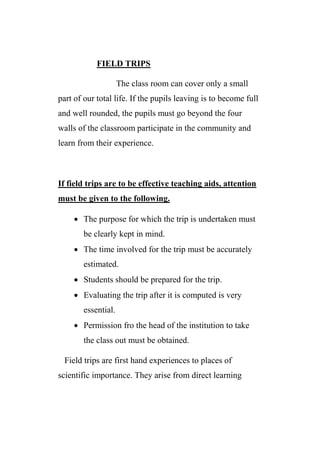
Field trips
- 1. FIELD TRIPS The class room can cover only a small part of our total life. If the pupils leaving is to become full and well rounded, the pupils must go beyond the four walls of the classroom participate in the community and learn from their experience. If field trips are to be effective teaching aids, attention must be given to the following. The purpose for which the trip is undertaken must be clearly kept in mind. The time involved for the trip must be accurately estimated. Students should be prepared for the trip. Evaluating the trip after it is computed is very essential. Permission fro the head of the institution to take the class out must be obtained. Field trips are first hand experiences to places of scientific importance. They arise from direct learning
- 2. situations. They play the same role in the learning of science as do experiments and demonstration. The Five steps in the conduct of field trips are: 1. Planning. Planning is the initial step which is deterring the future course of action. The proposed site should be surveyed well in advance. Dale and time should be decided, mode of travelling should be travelling should be booked at the earliest. Expected expense per student should be calculated. 2. Preparation. The aim of visit should be made clear to the pupils. Places of scientific Interest, duties and responsibilities of each pupil should be made definite. Permission of the places to be visited should be secured well in advance. Permission of parents for the field trip should be obtained before the commencement of the programme. 3. Execution
- 3. This step is concerned with the execution of the plan ie, undertaking the activity, completing and searching the results. If any unavoidable things may happen, it is necessary to collect contact telephone numbers of school personal to inform them at the earliest. Here, teacher should act as a guide. 4. Follow up. Follow- up work will ascertain about the planning and organization aspects of the field trip. Pupils may be asked to write a report display materials collected during field trip. Follow- up will be use full in reviewing the role of each member. 5. Evaluation. It is an essential and important stage in a field trip. After the field trip, pupils must review their work and try to see what mistakes they have committed in execution. Thus is a stage of self criticism by the pupils, which helps the teacher to improve the future planning effectively. Advantages. Field trips act as follow- up experiences
- 4. Field trips should be for review and drill. During field trip all senses are brought into action. Field trips awaken many interests that lass room work cannot arouse. Field trip is the study of actual object and objects stimulate more curiosity that do ideas. Field trip permits a class to engage in activities that are too noisy or too violent. Field trips are generally much more closely related to the out – of- school experiences of young people than an the experiences gained in the class room. Reference. Science Education- Theoretical Base of Teaching & pedagogic analysis- Dr. T. M Mollykutty.